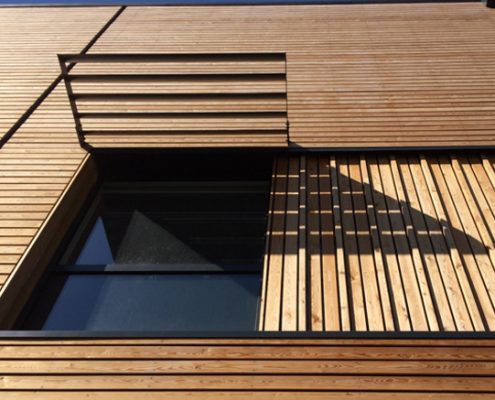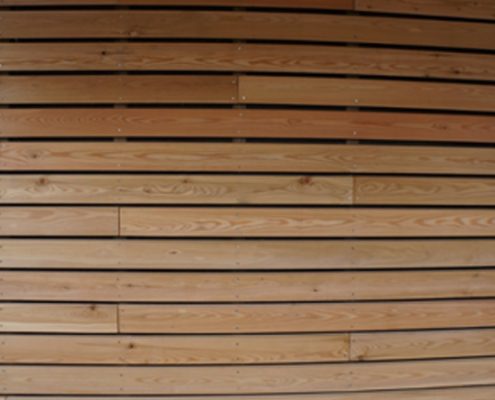NORCLAD® SIBERIAN LARCH (LARIX SIBIRICA) – DURABLE SOFTWOOD
This is a durable specie with the sapwood omitted. It is a slow grown high density, softwood with a colour that ranges form a light straw yellow to a gold/brown in the heartwood area.
Siberian larch is one of the most durable species of coniferous softwood and comes from Siberia in Russia. It is one of the hardest and strongest commercial softwoods, with only Pitch Pine generally stronger.
Siberian larch has excellent machining properties, though knots may be troublesome, and is suitable for many end uses from external joinery and cladding applications, areas of potential high impact damage such as schools, shops to boat planking.
Siberian Larch will colour down if it is not protected as soon as installation is complete with a good quality semi or fully translucent UV-radiation protective coating.
More Information
The Siberian Larch or Russian Larch (Larix Sibirica) is a frost-hardy tree native to western Russia, from close to the Finnish border east to the Yenisei valley in central Siberia.
It is a medium-size to large deciduous coniferous tree reaching 20-50 metres. Because of its rot resistance, larch wood is especially valuable for posts, poles, railroad tie sleepers, and mine props. It is also used in many velodromes around the world as the track surface including the Manchester Velodrome and the Velodrome Krylatskoye in Moscow. It is grown in Canada and the northern United States to a limited extent, first cultivated there in 1806.
Wood Type: Softwood.
Origin: Russia (and to a lesser extent North America and Western Canada).
Sustainability: Sourced from well managed forests – FSC certified available on request.
Availability: Sawn and planed products in a wide range of thicknesses, widths and profiled patterns.
Colour: Varies from pale yellow to Orange to Golden Brown.
Quality: Imported as Unsorted (1,11,111,1V).
Typical end uses: Joinery and Cladding.
Durability: Durable.
Density: 590-650 kg per m3 at 12% moisture content.
Dimensional stability: It has a tendency to distort when wet or not dried, but once dry, is generally stable.
Fixings: We would recommend only top quality stainless steel fixings are used to avoid corrosion of fixings and blue staining of the profile.
Ring shank nails are preferable to normal wire nails as ring shank nails offer extra grip. We would suggest the length of the nail should be two and a half times the thickness of the board. The nail should penetrate the batten by at least 32mm.
Strength & Working properties: It is one of the hardest (50% harder than Scots Pine) and strongest commercial softwoods available, with only Pitch Pine generally stronger. It can be sawn and machined well however it can split on nailing so pilot drilling of fixing holes is recommended particularly at board ends.
Sizes and lengths available: 25mm, 38mm, 50mm, 63mm & 75mm Thicknesses//100 mm wider 1.8 – 4.8 metres and longer.
Get a Quote
Contact us for more information, a sample or a prompt quotation.





